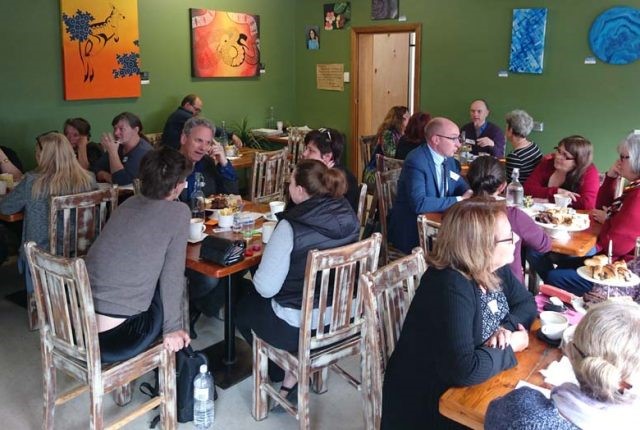SEPTEMBER 22, 2017
The room looked beautiful as the morning rays brought light and warmth to the space in readiness for the Death Cafe. Six wooden tables beamed a splash of Spring colour from the freshly cut golden wattle and mauve lavender sprigs in recycled port glasses. A bottle of chilled water, 4 glasses, a small tissue pack, fluro post-it notes and a couple of pens created the table centrepieces. The pre-printed name tags lay ready next to the registration list with the names of the twenty four people who had booked through Eventbrite. The buzz started as the guests started arriving at 9:30am. Hot drinks were ordered, seats selected and tiers of sweet and savoury delicacies were placed on each table. By 10:00am the scene was set to facilitate my 5th Death Cafe.
Alchemy Café once again generously provided a warm and inviting venue for the Death Café. Mignon, her family and staff have supported my community engagement activities about death and dying for the last 4 years. Today they continued that support by allowing us to use the main café area for the morning and offering a generous Death Café special for attendees with scrumptious and delicious treats.
It was comforting to see familiar faces who have attended previous Death Cafes, as I welcomed the guests. Today we came together to enjoy a cuppa, cake and conversation about death. Why do we do this? Because there are few spaces in our culture that encourage and nurture conversations about death. Usually we only talk about death, dying and bereavement when someone is dying or has died and we are forced to talk about death to organise end of life matters. Speaking about death outside of this context can label us as morbid.
A Death Café is a welcoming space to talk about death. There are no agendas, objectives or themes. It is a group discussion rather than a grief counselling session. We come together to talk, listen and share insights. The ground rules are simple: listen, respect other viewpoints and retain confidentiality. Today I set the room up with four people to a table. In previous Death Cafes I have tried different numbers like 6 to a table. Feedback suggested that four per table would be better in the 2 hours allowed. I was interested to receive the evaluations today to see if people preferred this revised seating.
A facilitator was selected for each table who then asked each person for their name and what brought them here today. The conversation at each table went on for an hour, with the last ten minutes to address any post-it note items and wrap up any discussions in progress. In case the conversation waned, a page of conversation prompts was given to each table facilitator. Some interesting quotes included:
“I want to die in my sleep like my grandfather … not screaming and yelling like the passengers in his car”
Will Shriner
There was a constant buzz in the room as the conversations ebbed and flowed as the topics emerged. Sometimes riotous laughter burst forth from a table, other tables spoke quietly for a time with concerned expressions as deep listening occurred.
After the hour, we then came together as a group and each table shared a summary of what had come up for them and any insights they had gleaned. Today’s topics were many and varied across each table including:
- Are kids in school too young to have death education or is it the responsibility of the parents/family?
- We treat death far too seriously
- Body donation in Australia
- Keeping your end of life paper work updated like wills and advance care directives
- Work at ticking things off your bucket list while you can
- We internalise grief in Australia – stiff upper lip – no wailing at funerals like other cultures
- Prenatal and infant death is an overlooked topic in Australia
- It’s good to have rituals around death to acknowledge a person’s existence
- Difference between memorial services and funerals where a memorial service may happen at any time and usually without the body present
- Important to tell your loved ones what you want when you die because family expectations can be different from your wishes
- Suicide and euthanasia was discussed at one table around being able to conceptualise your own ending and the challenges with doing this for the people left behind
- Death awareness helps you become more enlivened
- Bhutanese contemplate death 5 times a day. Interesting to research the link between that practice and the Happiness Index in Bhutan
- Humour at funerals can work sometimes
- Language around death is interesting in our culture e.g. lost your child rather than your child died, passed instead of die
83% of evaluation sheets were returned. The age range encompassed people between twenties to eighties with 20% men. The median age was in the 45-54 bracket. Everyone had a great time and would encourage others to attend. This time I tried 4 people to a table and the feedback was that this number was perfect for the 2 hours available for the Death Café. In the past I have seated 6 to a table and the feedback was that people had not felt heard. It seems that 4 per table is the perfect number.
Let me know if you would like to come to the next Death Cafe and I will add you to the contact list before seats book out.
